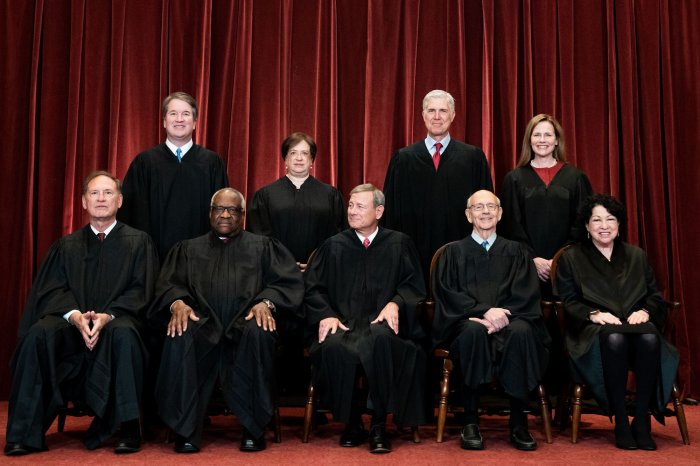1 of 5 | Opponents of capital punishment gather outside the U.S. Supreme Court in Washington, D.C., on Tuesday to mark the anniversaries of two related decisions concerning the death penalty. Thursday, the court finishes its term and won't return until the October term. Photo by Bonnie Cash/UPI |
License Photo
July 1 (UPI) -- In a pair of ideological 6-3 decisions, the U.S. Supreme Court on Thursday upheld restrictive voting laws in Arizona and struck down a California law that mandates disclosures of political donor lists.
The break along the conservative-liberal line seemed to be one of the clearest signs of the divided court with a solid conservative advantage, with both rulings benefiting Republicans.
In the Arizona case, Republican lawmakers there argued that the voting laws were created to prevent "ballot harvesting," a term for when groups turn in early voting ballots for voters at drop boxes, as an anti-fraud measure.
Democrats argued that the laws will hinder communities of color.
The high court agreed with Arizona Republicans, concluding that there's no evidence to demonstrate how the rules discriminate against minorities. It also said they were enacted with no racial intent and do not violating the federal Voting Rights Act.
In dissent, Justice Elena Kagan argued that voter suppression remains a real issue and the court had an obligation to address it. Liberal Justices Sonia Sotomayor and Stephen Breyer joined in dissent.
"This court's duty is to apply the law as it is written," Kagan wrote. "The law that confronted one of this country's most enduring wrongs; pledged to give every American, of every race, an equal chance to participate in our democracy; and now stands as the crucial tool to achieve that goal.
"That law, of all laws, deserves the sweep and power Congress gave it. That law, of all laws, should not be diminished by this court."
In the California case, the court ruled on a law that Democrats argued would help them police fraud in charitable organizations. It required nonprofits and charitable organizations to disclose a list of political donors to the state attorney general.
Chief Justice John Roberts, writing for the majority, said the requirement is unconstitutional and too broad.
"When it comes to the freedom of association, the protections of the First Amendment are triggered not only by actual restrictions on an individual's ability to join with others to further shared goals," Roberts wrote. 'The risk of a chilling effect on association is enough."
The ruling was a victory for conservative donor Charles Koch, who backed the efforts of the Americans for Prosperity Foundation in filing one of the suits against the California law.
The high court's decision overturns a lower court ruling that affirmed the California law.
As with the Arizona case, Kagan, Sotomayor and Breyer dissented from the majority opinion.
Thursday is the final day of the Supreme Court's 2020-21 term, which was conducted entirely remotely for the first time. Justices won't return until the next term begins on Sept. 27.
Members of the U.S. Supreme Court pose for a group photo at the court in Washington, D.C., on Friday. Seated, from left to right, are Associate Justices Samuel Alito and Clarence Thomas, Chief Justice John Roberts and Associate Justices Stephen Breyer and Sonia Sotomayor. Standing, from left to right, are Associate Justices Brett Kavanaugh, Elena Kagan, Neil Gorsuch and Amy Coney Barrett. Pool Photo by Erin Schaff/UPI |
License Photo
















